

Planet boundaries. The Anthropocene Debate: Marking Humanity’s Impact by Elizabeth. 17 May 2010: Analysis by elizabeth kolbert The Holocene — or “wholly recent” epoch — is what geologists call the 11,000 years or so since the end of the last ice age.
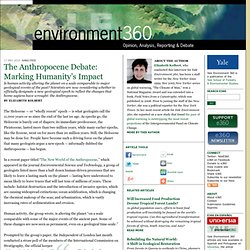
As epochs go, the Holocene is barely out of diapers; its immediate predecessor, the Pleistocene, lasted more than two million years, while many earlier epochs, like the Eocene, went on for more than 20 million years. Still, the Holocene may be done for. People have become such a driving force on the planet that many geologists argue a new epoch — informally dubbed the Anthropocene — has begun. In a recent paper titled “The New World of the Anthropocene,” which appeared in the journal Environmental Science and Technology, a group of geologists listed more than a half dozen human-driven processes that are likely to leave a lasting mark on the planet — lasting here understood to mean likely to leave traces that will last tens of millions of years.
Are we living in the Anthropocene? “We simply discussed it,” he said. Learning How to Die in the Anthropocene. Jeffery DelViscio The Stone is a forum for contemporary philosophers and other thinkers on issues both timely and timeless.
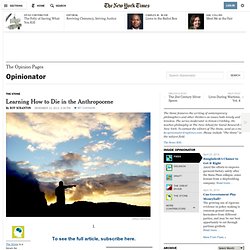
To see the full article, subscribe here. Civilizations have marched blindly toward disaster because humans are wired to believe that tomorrow will be much like today. Every day I went out on mission in Iraq, I looked down the barrel of the future and saw a dark, empty hole. (Early Modern?) Anthropocene. Waves-of-Innovation-4-5-12.png (1039×737) A Cartography of the Anthropocene. The Anthropocene: A primer.
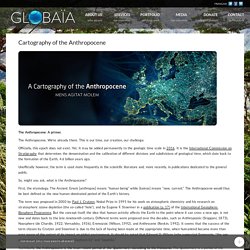
The Anthropocene. We’re already there. This is our time, our creation, our challenge. Officially, this epoch does not exist. Yet. Unofficially however, the term is used more frequently in the scientific literature and, more recently, in publications dedicated to the general public. So, might you ask, what is the Anthropocene? First, the etymology. The term was proposed in 2000 by Paul J.
Welcome to the Anthropocene. 'Welcome to the Anthropocene' Earth Animation. Will Steffen: The Age of the Anthropocene. L'anthropocène, une nouvelle ère géologique ? - une vidéo High-tech et Science. Mark Lynas: The Nine Planetary Boundaries. Mark Lynas. Johan Rockström - Planetary boundaries. Claude Lorius - voyage dans l'anthropocène. The geology of the planet: Welcome to the Anthropocene. THE Earth is a big thing; if you divided it up evenly among its 7 billion inhabitants, they would get almost 1 trillion tonnes each.
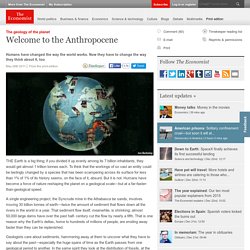
To think that the workings of so vast an entity could be lastingly changed by a species that has been scampering across its surface for less than 1% of 1% of its history seems, on the face of it, absurd. But it is not. Humans have become a force of nature reshaping the planet on a geological scale—but at a far-faster-than-geological speed. A single engineering project, the Syncrude mine in the Athabasca tar sands, involves moving 30 billion tonnes of earth—twice the amount of sediment that flows down all the rivers in the world in a year. That sediment flow itself, meanwhile, is shrinking; almost 50,000 large dams have over the past half- century cut the flow by nearly a fifth. The carbon cycle (and the global warming debate) is part of this change. The new geology leaves all in doubt Thinking afresh is the easier bit. The Anthropocene Debate: Marking Humanity’s Impact by Elizabeth. Anthropocène. LE MONDE | • Mis à jour le | Par Hervé Kempf (Chronique "Ecologie")
Jacques Grinevald : genèse et destin du concept d'anthropocène. De la pertinence du concept d’anthropocène pour penser la Décroissance Situer l’époque actuelle dans l’évolution biologique et environnementale à l’échelle des temps géologiques L’anthropocène est une croissance fantastique, quasiment cancéreuse et délirante, d’une espèce zoologique singulière, menée par une civilisation particulière, au sein de la pluralité des mondes humains qui existent sur la terre depuis des dizaines de milliers d’années. (…) L’anthropocène est un concept extrêmement intéressant pour obliger les scientifiques à démolir ce mur qui séparait les sciences de l’homme et les sciences de la terre.
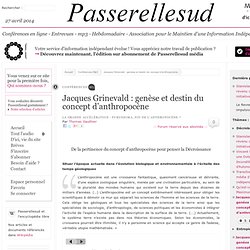
Cela oblige les géologues et tous les spécialistes des sciences de la terre ainsi que les spécialistes de sociologie, d’anthropologie, de sciences politiques et les économistes à intégrer l’activité de l’espèce humaine dans la description de la surface de la terre. (...) Actuellement, le système terre n’existe pas dans nos théories économiques.